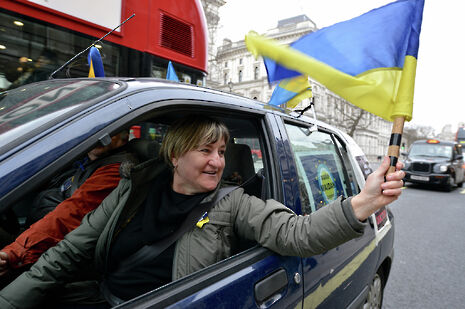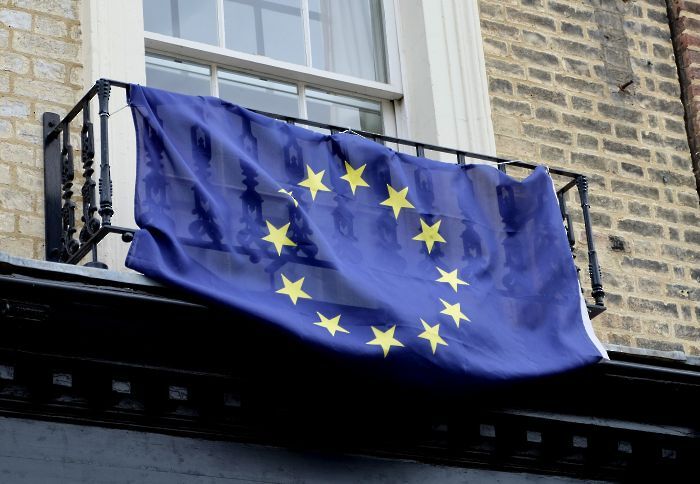From Kyiv to Shoreditch, it can be difficult ‘belonging’
With a heritage that spans Ukrainian, Polish, Russian, and English cultures, Julia Lasica is well placed to reflect on the realities of national identity

From my very birth, my Ukrainian, Polish and Russian heritages began to shape and define my experiences. Memories of the snow-laden streets of Kyiv and the fields of golden corn outside the capital, skirted by pine forests and railway tracks, made up the majority of the early years of my childhood. I learned the Ukrainian words to describe the glimmering icicles hanging from the trees in winter, my father taught me his native Polish and I quickly picked up Russian from the nostalgic, Soviet era cartoons and picture books.
Soon after, however, I moved to London. I went to school there, and learned English, reading the brightly coloured Dahl and Beatrix Potter in the quiet corners of the classroom. I never pondered deeply which country I belonged to before my fifteenth birthday, but found myself drawn to the ‘English’ identity I found scattered around me in the Turners and Constables in the Tate, or the images of the long canals, draped in green, which I imagined were inhabited by creatures like Toad and Mole.
“European, national and regional flags hung from every window sill, fluttering in flurries of snow”
Then, in the winter of 2013-4, the central square of Kyiv ran awash with the nation’s blue and yellow flags. The protests first begun by students, angered by the then president’s refusal to allow closer integration with the European Union, grew into what became known as the Revolution of Dignity in Ukraine. It was referred to as such by Ukrainians since it was (and is) seen as the moment at which a modern Ukrainian national identity was formed. Antagonised by centuries of colonial oppression, moving in turn from Imperial Russia to the USSR and then Putin’s policy, Ukrainians sought to win back the dignity to develop and thrive without bowing to the pressure and influence of the Kremlin. Ordinary people left work unattended and rushed to the centre from all corners of Ukraine to defend their country’s liberty.
It was into an atmosphere of national unity and rapture that I was launched when I visited my family that Christmas. Across the country, statues of Lenin were felled daily, bridges and walls were painted blue and yellow, people greeted one another with the revolutionary slogans. European, national and regional flags hung from every window sill, fluttering in flurries of snow. Spending New Year’s Eve and many other days on that square, all that I had imagined of my national identity was swept away by revolutionary euphoria and unity. Returning to London, and witnessing first the shootings of peaceful protesters on the Maidan by the special police forces, followed by the sudden apparition of Putin’s unmarked green soldiers in Crimea in spring of 2014, my Ukrainian national identity was only cemented. I platted blue and yellow ribbons onto my bags and around my wrist, sang Ukrainian folk songs to myself as I walked to school and learned poems by Shevchenko.
“Britain woke to confusion on that cold, grey morning”
It was an intense feeling of belonging which I had never felt before and it pervaded my very sense of being. In London, I suddenly felt like a stranger, yearning for summer to arrive when I could finally fly back to my Ukrainian family. Countless times strangers, who would turn out to be Ukrainian, would stop me in the street after noticing the colours of my bracelet and we would greet one another in our mother tongue. I felt utterly disconnected from England then, and hardly paused to give the ‘English’ part of me a second thought as the war in Eastern Ukraine began to rage.
And then yet another event occurred which shook my perception of national identity once more. On the 23rd of June, I had canvassed for Remain and my day seemed to culminate in intense optimism as I watched a European flag held up on stage at the end of a concert in Shoreditch. The organiser’s closing remarks, that she hoped we woke up in a ‘European Britain’, were greeted with cheers by the crowd.
But we didn’t. Instead, Britain woke to confusion on that cold, grey morning, as the divisions between the countries making up the UK, the urban and rural areas, the young and the old, ran deeper and clearer than ever. My little bubble of optimism, in which it was assumed that Europe (despite its many failings and faults) was ultimately associated with security and progress, was shattered. I had taken it for granted that such strong anti-European sentiment coursed through English identity, and turning to it then, I found little to connect with.
Since coming to Cambridge, time has passed since both of these momentous events which have shaped my national identity. My Ukrainian idealistic fervour has been numbed to an extent, and I have had exposure to nuances in the Brexit debate. However, Europe is clearly a pivot around which Ukrainian and English identities are formed in my experience; while the former is solidified positively by its European associations, ‘English’ identity is splintered under such pressure. I first visited the Parthenon marbles when I was six in the British Museum, and it seemed very ‘English’ to me for many years. Yet seeing the other half of Poseidon’s body stand fragmented in the Acropolis Museum last year, separated from his torso in London, I was reminded very forcefully of the contentious, strained relationship stretching from the white cliffs of Dover across the Channel, and the effect it has on the ‘English’ identity
 News / Caius mourns its tree-mendous loss23 December 2025
News / Caius mourns its tree-mendous loss23 December 2025 News / Clare Hall spent over £500k opposing busway 24 December 2025
News / Clare Hall spent over £500k opposing busway 24 December 2025 Comment / Yes, I’m brown – but I have more important things to say22 December 2025
Comment / Yes, I’m brown – but I have more important things to say22 December 2025 Comment / The ‘class’ of Cambridge24 December 2025
Comment / The ‘class’ of Cambridge24 December 2025 Interviews / Politics, your own way: Tilly Middlehurst on speaking out21 December 2025
Interviews / Politics, your own way: Tilly Middlehurst on speaking out21 December 2025








